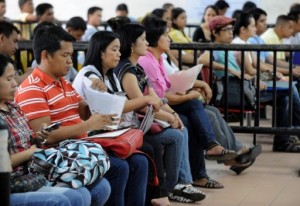Economists urge gov’t to focus on job creation, peso appreciation

Workers line up for overseas jobs at the Philippine Overseas Employment Administration (POEA) office in Manila. Economists said the Philippines should focus of job creation. AFP PHOTO/JAY DIRECTO
MANILA, Philippines—As inflation is seen to remain tame or at least within the official target band, the government should focus on other important issues, particularly employment, to achieve its aim of inclusive growth, private economists said.
The National Statistics Office (NSO) reported on Tuesday that inflation reached 3 percent in January 2013, slightly up from 2.9 percent in December 2012. It was slower compared to the 4-percent hike a year ago.
“From a public policy standpoint, whether it’s 2.9 percent or 3 percent is of little significance. Inflation will continue to be tame because of the peso appreciation,” Benjamin Diokno, of the University of the Philippines School of Economics and former budget secretary, said via text message. As such, he said, policymakers should focus on two related concerns: persistently high unemployment and the appreciation of the peso.
Victor Villegas of the University of Asia and the Pacific also said the focus should be on job creation. “NSO should be given a budget to make do a labor force survey monthly, instead of quarterly,” he said.
Citing a World Bank study, Villegas noted that the Philippines needed 3.5 million jobs a year, or more than the previous target of 1 million jobs per year. “That can be achieved only by a depreciating currency,” Villegas said.
Article continues after this advertisementAccording to World Bank Country Director Motoo Konishi, the Philippines needed 14 million jobs between now and 2016. “The domestic job market in the formal, services and manufacturing industries and the jobs abroad are not enough to absorb so many people getting into the labor force. This means that all other sectors in the economy, particularly agribusiness and agriculture, must contribute more to address joblessness and poverty. Job creation is even more urgent in Mindanao as jobs contribute also to social cohesion,” Konishi said.
Article continues after this advertisementThe need for jobs that raise real wages or bring people out of poverty is a “challenge,” he said.
The 3 percent inflation rate in January was within the official target band. The government aims to keep inflation within the 3 to 5 percent range this year, according to the Development Budget Coordination Committee.
The National Economic and Development Authority (Neda) attributed the slight rise in prices to higher food and power prices and the implementation of the new sin tax law.
Neda Assistant Director-General Rosemarie G. Edillon noted that the overall growth of consumer prices in the Philippines was still slower compared with those in Indonesia and Thailand in January 2013. Headline inflation in Indonesia and Thailand stood at 4.57 and 3.39 percent, respectively, during the period.
Also on Tuesday, the peso fell after the government reported that inflation slightly accelerated in January from month-ago level. The local currency closed at 40.645 to the US dollar or 5 centavos lower than the 40.595:$1 on Monday. Intraday high hit 40.62:$1, while intraday low settled at 40.65:$1. The volume of trade amounted to $740.4 million from $938.5 million.